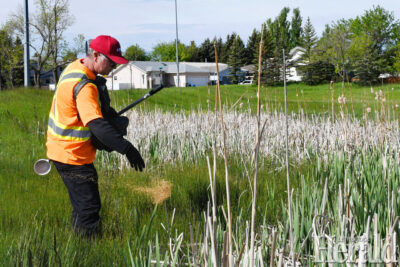City declares war on mosquitoes
By Delon Shurtz - Lethbridge Herald on May 29, 2024.
 Herald photo by Delon Shurtz
Todd Carter, mosquito technician with the City's parks and cemeteries department, throws bacteria-laden cornmeal into some standing water as part of the mosquito mitigation program.
Herald photo by Delon Shurtz
Todd Carter, mosquito technician with the City's parks and cemeteries department, throws bacteria-laden cornmeal into some standing water as part of the mosquito mitigation program.LETHBRIDGE HERALDdshurtz@lethbridgeherald.com
The city’s annual war against mosquitoes has begun in earnest. Unfortunately, the enemy badly outnumbers the city’s lone soldier.
“I’m one man against billions, but I’ll get out there and keep track of what’s going on with our mosquitoes throughout the city and surrounding area,” says Todd Carter, mosquito technician for the City’s parks and cemeteries department.
Carter kicked off the mosquito mitigation program Tuesday, and said while last year’s drought kept mosquito populations relatively low, he expects the number of mosquitos to be about average because of the wet spring.
“Some hot weather coming up in the next couple of weeks is going to start mosquitoes hatching, and we’ll start seeing more and more adults as the season progresses,” Carter said.
The City attacks mosquito larvae several days after a rainfall and treats them with larvicide to keep their numbers down before they reach adulthood. Carter said the city has an extensive mapping system and regularly monitors shallow, stagnant, semi-permanent water bodies, looking for “hotspots.”
“This year with the heavy rains in May, we’re seeing more standing water than in the past so that could kind of affect the numbers, I think, maybe a little bit more. I’ll be out there and monitoring all our new areas of standing water.”
The City uses a bacteria that is placed on cornmeal then tossed by hand into standing water. The bacteria is non-toxic and only targets mosquito larvae, black flies and certain species of midgets. Carter added the program will not impact drinking water.
He pointed out the mitigation program targets larvae before they hatch, not mosquitos once they’re out and about. The City no longer runs a fogging program.
“That was a thing of the past. Today the public is not very supportive of using pesticide fogging methods.”
Although Carter anticipates the mosquito populations to be low to average this year, he said the mitigation program is necessary to prevent the numbers from climbing. And while residents may be eager to get out and soak up the sun, especially following a cool, wet spring, Carter reminds them the ideal conditions for mosquitos is hot, wet weather.
“It’s more to do with the water temperature. As we see more sunny, warm days, that water temperature is gonna increase and encourage larvae to hatch.”
In addition to the city’s mitigation program, residents are encouraged to wage their own war against mosquitoes.
“Make sure you don’t have standing water in your own yard,” Carter advised. “Keep your bird baths clean and emptied; fresh water. Cover your rain barrels. If you have any standing water in your lawn, do your best to reduce that or get rid of it completely.”
Despite mitigation efforts, the City and residents can’t eradicate all of the mosquitoes, but they can take steps to protect themselves from the annoying pests. Fortunately, Carter said, West Nile virus is not as prevalent as it once was, and people can take steps to avoid being bitten.
“Stay indoors during…the height of mosquito populations during the day; early morning, at dusk. Wear long sleeves, wear pants, use the insect repellant.”
Carter said the mitigation program will run throughout the season until the temperatures begin to drop in the fall.
18-17


